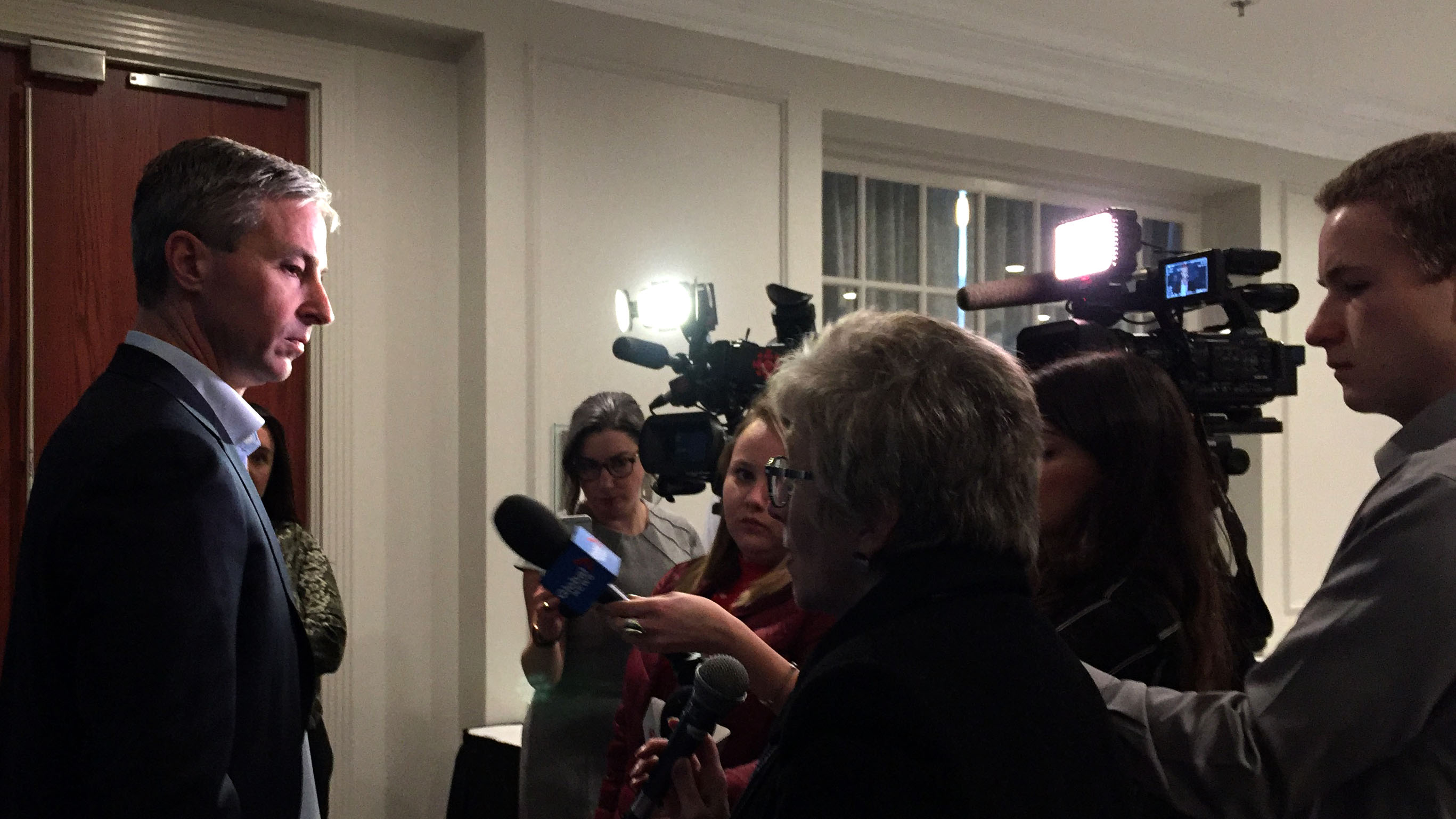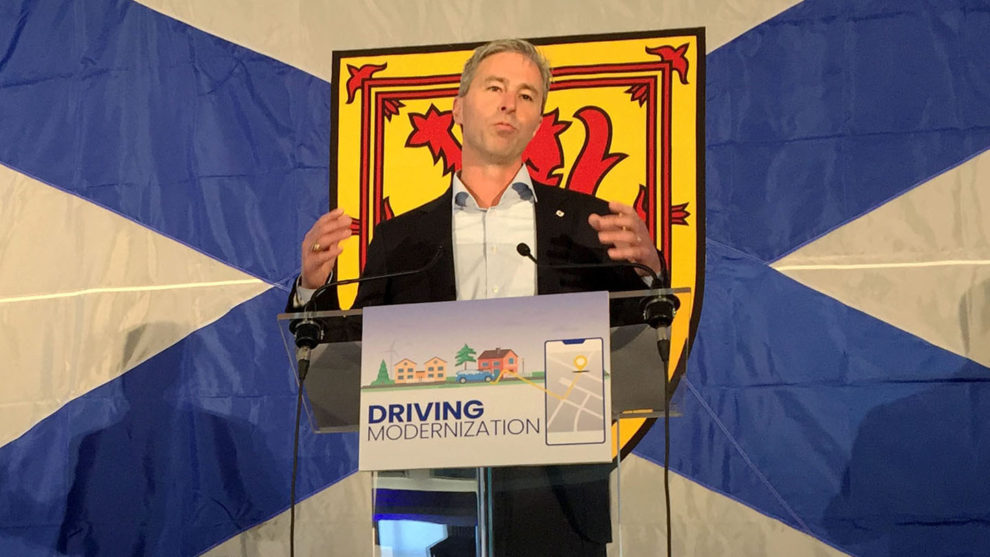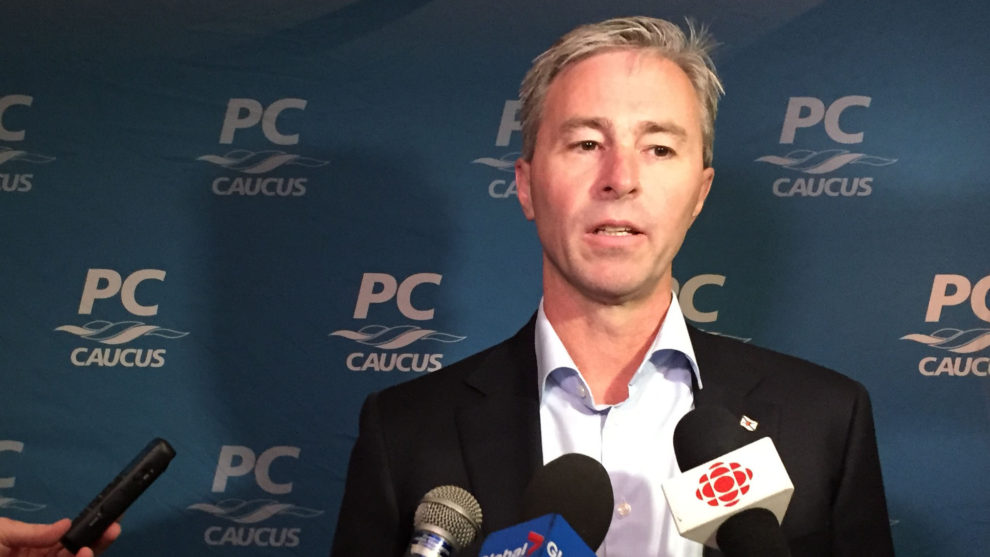Conservative Party announces proposed bill to encourage ridesharing in Nova Scotia
The party plans to introduce the bill for government vote shortly after legislature reopens later this month

caption
Tim Houston, leader of the Nova Scotia Progressive Conservative Party, speaks to reporters following the announcement.The Nova Scotia Progressive Conservative Party announced they will present a bill that would create a new class of drivers’ licence to “remove barriers” for rideshare companies hoping to expand into Nova Scotia.
“Obviously the demand for ridesharing is here, and that’s why today I’m very excited to announce that the PC party is giving ridesharing the green light in Nova Scotia,” Tim Houston, leader of the Nova Scotia Progressive Conservative Party, said to a crowd of more than 100 people on Sunday.

caption
Houston speaks to the crowd during the announcement.Houston explained the licence would be a restricted Class 4 licence, specifically for rideshare drivers. The legislation would enable rideshare companies to enter into rural and urban Nova Scotia much easier.
If passed, rideshare drivers would need to complete several criteria to earn the licence: undergo a criminal record check, with an update every two years; have three years of driving experience with a Class 5 licence; and complete a training program that includes diversity training, safe driving training and conflict resolution.
Houston believes that introducing ridesharing to the province is a government discussion that is long overdue.
“Whatever the provider, Nova Scotians and those that visit this province should be able to access ridesharing. They should have access to the same transportation options that all of those in 65 countries, and 700 cities around the world have,” he said during the announcement.

caption
Houston announcing the rideshare bill on Sunday at The Westin Nova Scotian.Prince Edward Island (P.E.I) added to that growing number last year. But their restricted Class 4 licence requires much less from its applicants.
Applicants must have a valid drivers licence, have a good driving record and meet medical/vision standards, pass an interview with Access P.E.I with Highway Safety staff, and provide their previous five years of driving records.
Municipalities will also have to be on board for the change to be effective. Houston said his goal is “to work with municipalities to make sure that they understand why this is important to Nova Scotians.”
According to the Motor Vehicles Act, municipalities have the power to regulate the amount of rides for hire in their area, but Houston said the province has the ability to change that.
When can we expect it?
The Conservatives plan to introduce the legislation for a vote shortly after the legislature reconvenes on Feb. 20.
When asked if he thought the bill would pass, Houston chuckled.
“If history is an indication, this particular bill might not. This majority government has not been very willing to open to ideas from anyone but their own caucus,” he said.
“I think they followed our lead on some things in the past and maybe they’ll see that this is a necessary thing and get it done.”
If the Conservative bill isn’t passed, Houston said he will reintroduce it.
Safety in apps
Houston also addressed the growing concern of safety while traveling in taxis following multiple sexual assault allegations involving Halifax taxi drivers over the last few years.
“Ridesharing companies have one very clear advancement that’s an advantage for passenger safety, and that’s the ability for people to instantaneously provide feedback,” said Houston.

caption
Houston addresses safety involving ridesharing with reporters.Along with reviews, Uber also has an emergency button within the app. The button allows the rider to contact emergency services and provides them with the rider’s real-time location and trip details that are shared with the dispatcher.
‘Too many cabs in Nova Scotia’
Houston addressed the common issue of ride service saturation when introducing companies like Uber and Lyft.
“I’ve been in big cities where there’s thriving taxi industries and you can get rideshares,” he said during an interview after his announcement. “Technology is advancing, the world is advancing, society is open to these advancements and government should be too.”
The idea of ridesharing companies coming to Nova Scotia isn’t as exciting for residents who feel their jobs will be put in jeopardy.
Darshan Virk, president of the United Cab Drivers Association (UCDA) which represents 350 taxi drivers or owners in Halifax Regional Municipality, said adding more competition to the ride services market will impact the livelihoods of cab drivers.
“The government, whether it’s municipal or provincial, [if] they go ahead, they’re going to ruin the taxi industry,” Virk said. “There are too many cabs in Nova Scotia. People are making hardly any money at all.”
Virk doesn’t think ridesharing companies will have much success in the province with the amount of taxis already operating in Nova Scotia.
The Department of Energy and Mines recently released a tender looking for rideshare companies, to come to three rural areas of Nova Scotia for a pilot program, amounting to $250,000.
In a November 2019 interview with CBC, Derek Mombourquette, the province’s energy minister, said he is interested in the idea of Uber coming to rural areas of the province.
“We may get requests from Uber or Lyft. We may have proposals for some kind of carpooling,” said Mombourquette.
The tender closed on Jan. 31, but no bidders have been announced.
About the author

Kate Woods
Kate Woods is a journalism student living in Halifax, originally from Coldbrook, a small village in the valley. She loves books and hearing people...
Dayne Patterson
Dayne Patterson is a recent graduate student at the University of King's College. He's reported from all over Canada, including B.C., Alberta,...

C
Cindi